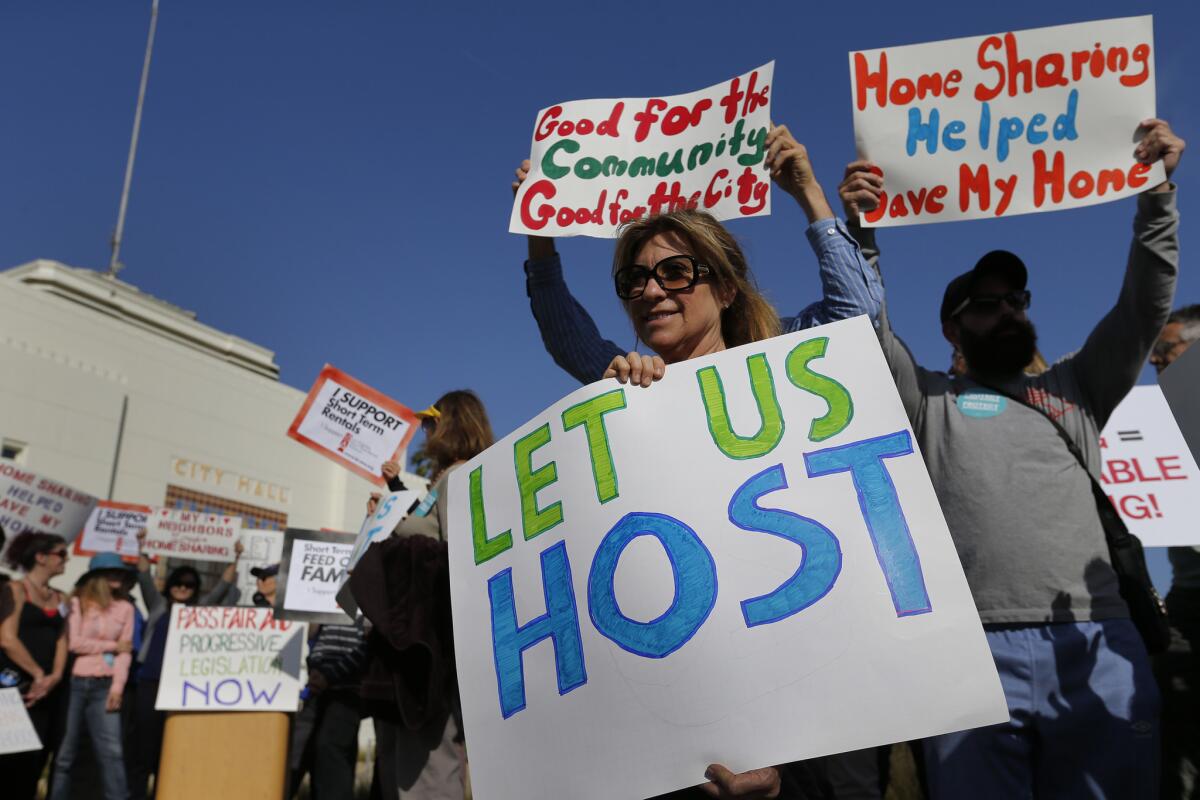Burbank’s ordinance banning short-term rentals in limbo

Airbnb supporters rallied outside Santa Monica City Hall Tuesday, May 12, 2015, before the city council voted unanimously to approve a measure that explicitly bars renting units for fewer than 30 days while also requiring home-sharing hosts to register with the city and pay taxes.
- Share via
While elected officials in Santa Monica approved strict regulations on the short-term rental industry there earlier this month, an ordinance that would have explicitly prevented the practice in Burbank neighborhoods has yet to take effect, despite getting unanimous City Council approval last June.
The ordinance, which would have banned boarding houses — which it defines as homes with residents not living as a single common household who pay for lodging for at least 30 days — and short-term rentals for less than 30 days in residential zones, failed to get a second reading as required for final passage.
“Normally they come back [for a second reading] right away,” said City Atty. Amy Albano. “There’s just been a lot of follow-up.”
Ordinances are typically brought back to the council for a second reading and vote two weeks after the first, Joy Forbes, director of the city’s Community Development Department, said last week. However, state officials raised concerns immediately after the council’s initial vote, which short-circuited that process.
At issue was a provision in the measure defining the term “family,” Forbes said, which raised concerns among officials with the Califonia Department of Housing and Community Development.
According to the proposed law, family is defined as people in a single household who share common areas, housekeeping and household expenses.
Additionally, it stated that the household must rent no more than two individual rooms for compensation under separate leases or rental agreements, unless required by a governmental funding program, and new residents must be selected by all existing adult members of the household.
Forbes said an attorney specializing in land-use law that the city had hired as a consultant agreed that the language was problematic, and officials have been working to revise the ordinance to satisfy those concerns. They are close to having a final version, Forbes said.
The revisions to the ordinance are significant enough that the ordinance would need to go before council for a first reading again sometime later this year.
The original ordinance was intended to strengthen the city’s code following public backlash over language in its state-required housing element that allowed group homes that don’t require licensing in single-family residential neighborhoods.
The changes approved had no impact on sober-living homes, however, which are still allowed in residential neighborhoods. Under the measure, six or fewer people living in a home, which may include sober-living homes, would be considered a standard residential use and would not require a permit.
Forbes said some members of Save Burbank Neighborhoods, one community group that had lobbied for the changes, had been informed late last year that the ordinance had not taken effect, but she did not believe there was a broader public notice about the matter.
Members of the group confirmed that they knew the ordinance still needed work. Group member Julie Fisher said she felt the item was “in limbo,” but she said the organization has been busy focusing its efforts on higher priorities including the antimansionization ordinance the council adopted in March.
In the meantime, while not expressly banned, short-term rentals are prohibited under the city’s code “by omission,” Forbes wrote in an email earlier this month, because such activities are considered a hotel use, which is not permitted in residential zones.
“Right now, we utilize the criminal enforcement options — it is a violation of municipal code,” Forbes wrote. “We find the criminal violation has been effective on most of our code enforcement issues (sometimes just explaining the rules and regulations with a soft touch works, too.)”
Those code violations are enforced in response to complaints, but it’s not clear how many complaints have been received related to short-term rentals — Forbes said the city doesn’t categorize the complaints in a way that provides an easy answer.
The practice, however, appears to be continuing. As of Thursday afternoon there were more than 100 rentals listed in Burbank on one popular vacation-rental site.